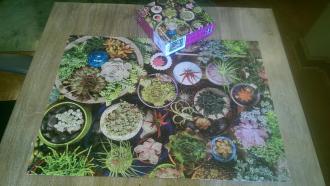News Taffy
| Post Your News Send Us An Event Start A Gallery |  |
| Most Recent | Most Popular | Top Contributors | Galleries | Events |
 | Contributor: admin subscribe to my stories |
 The Cardiologist's Wife - Give Your Brain A Workout .... Jigsaw Puzzles! I have always enjoyed various kinds of puzzles. From doing connect the dot as a young child to Rubik’s Cubes and logic puzzles as a teen, I have moved on to jigsaw puzzles as an adult. While some claim that doing puzzles such as Sudoku or Crossword help prevent mental decline as you age, scientists are in disagreement over any possible long term benefits. However, several studies have shown that those who do jigsaw puzzles regularly lower their risk for developing Alzheimer’s or other forms of dementia. Clearly your brain needs exercise or mental stimulation just as the rest of your body does to perform optimally. To get the stimulation it needs, your brain needs new challenges. The more frequently you perform a certain task and the better your brain becomes at that task, the less effort your brain requires to complete the task. For example, your brain may be on autopilot as you drive to work each day because you’ve driven the route hundreds of times. Learning new skills will keep your brain in shape. As you may know, the brain has two distinct sides or lobes, each of which deal with different functions. The right side deals more with emotions, creativity and intuition while the left side is where problem solving, analyzing and logical thought processes occur. Certain activities like working on jigsaw puzzles promote the use of both sides of the brain, thus exercising the brain cells and increasing their capacity and efficiency. While solving jigsaw puzzles, the brain produces more of the chemical dopamine, a neurotransmitter that aids in learning, memory and motor control. Other benefits from doing jigsaw puzzles are increased alertness, better concentration and heightened creativity. As you struggle to find the right piece, your visual perception and ability to think critically are enhanced. Jigsaw puzzles challenge your brain to analyze and problem solve while improving your visual-spatial reasoning. Even your memory gets a boost as you scan hundreds of pieces looking for just the right shape or color. We also receive much the same physical benefits from working on puzzles as we experience when meditating. Our breathing and heart rate slows and our blood pressure drops. A sense of calm and tranquility takes over, clearing our mind from the stresses of the day. There is also a healthy sense of accomplishment and satisfaction from completing a puzzle. Puzzles can encourage social interaction or solitary reflection, depending on your mood. Various kinds of puzzles can be useful in helping dementia or stroke patients by stimulating memory, building self esteem and providing entertainment. Puzzles for young children can develop eye-hand coordination and aid in color and pattern recognition. To get the most out of a puzzle, make sure the picture is appealing to you, it is difficult enough and at least 500 pieces. Challenge yourself further by only looking at the picture on the cover of the box once, then work from memory to complete the puzzle. Your brain will have to work extra hard to find where all those pieces go! [+] add comment |














